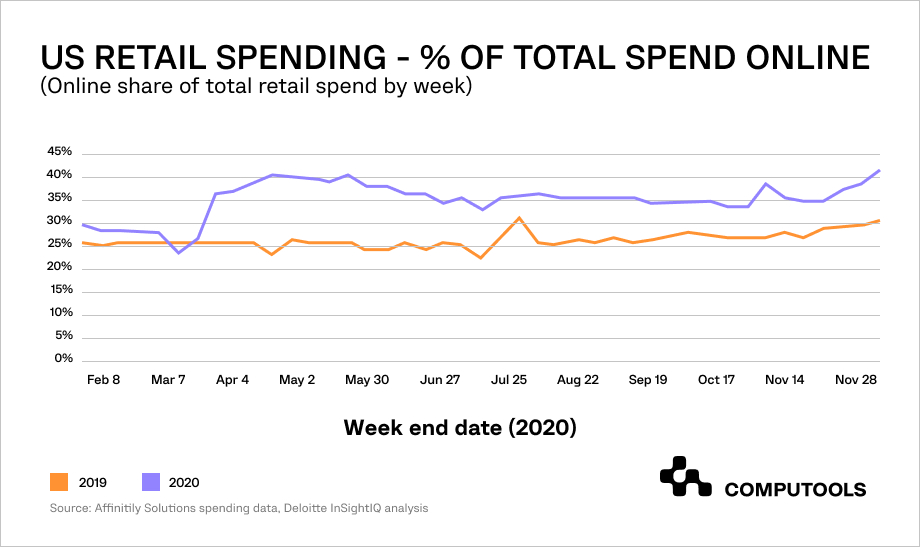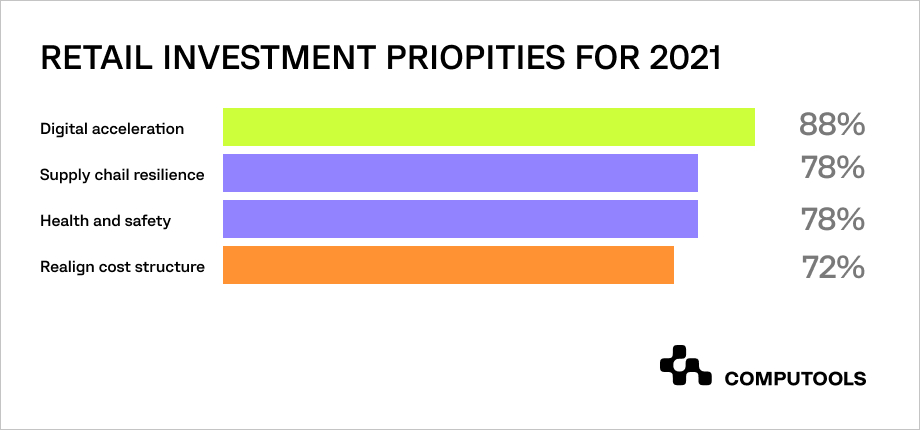Solutions to Challenges that are Hindering Profitability in the Retail Industry
Over the past three years, the retail industry has transformed rapidly. The Covid pandemic has had its fair share of influence on this process. Looking specifically at brick-and-mortar stores, it’s fair to say that business has suffered.
However, due to digital transformation, the retail industry as a whole continued to grow. By adapting to changes quickly, and onboarding the help of developers and other digital transformation experts retailers all around the globe were able to implement new applications and systems for online business.
Previously, small and medium-sized businesses lacked sufficient resources needed to organize their own production or logistics in order to grow; that’s changing rapidly because of technology.
Timely adaptation to market conditions, customer requirements, competitiveness, etc., all allow companies to stay afloat, but also to grow and expand. One of the main conditions for successful trading activities is prompt identification of problems and their effective solution.
The Internet & Direct Marketing Retail Sector: Pains and Solutions
The retail industry is developing. It’s grown 10% since 2019 and continues to hold steady at this level without indicators suggesting a decline anytime soon. COVID-19 was and still is a favorable condition for the acceleration of retail software development.

Long Checkout Processes
It’s not uncommon that a potential customer gives up and stops the checkout process because it was too difficult to complete or was talking too long to input their data and credit card information.
This is a bottleneck that has to be solved if it’s present in your application. To keep customers coming back, stores in the online retail industry need to optimize the User Experience. It is possible to implement a chatbot to help customers if they can’t make a decision or have difficulties with going to the next step.
A chatbot can also cover the most common questions/requests from users. With such solutions, the customer will only need to click a few buttons to process the order, and the items in the shopping cart will turn into actual purchases.
Poor Personalization and Lack of Customer Statistics
When a retailer doesn’t store data about its existing customers, it can’t make analytical predictions about future customers.
Without proper retail software development, it’s impossible to understand your target audience, and therefore create effective advertising campaigns and develop marketing strategies.
Implementing tools to collect the necessary data on financial statistics and its analytics will help solve this problem.
Lack of Software and Cloud Services
If a business does not have the technical ability to expand, its growth is very limited.
By introducing hybrid IT technologies via different software and cloud services, this pain point can be soothed.
Slow Customer Service and Response Times
A major reason online retailers lose reputation and customers is because of untimely responses to customer requests and inquiries.
Creating a bot for instant customer response will mitigate this problem and assure customers their request is processed. Visitors want timely responses to their questions, and tools that make this possible are priceless.
Unorganized Data Reporting and Dashboards
When there are no organized dashboards for visualizing business data, management struggles to make data-informed decisions. If a business doesn’t have clear insight into what’s working and not working budget will get spent in vain and profits will shrink.
Retail software solutions for automated reporting systems not only save time when filing and processing documents but also simplify the collection of information and analysis based on the reports received.
The Distribution Sector: Pains and Solutions
Distribution is another major part of the retail industry. This area of work is no exception to digital transformation. New solutions are the key to streamlining operations and increasing profit.
The logistical chain of getting a product to an end consumer, warehousing, and reporting are all undergoing changes with the help of retail software solutions.
The retail distribution division is one of the priority investment fields. Inventory management, the supply chain, and digital user interface, for example, have a 78% share in the retail investment priorities for 2021.

There are setbacks in this sector that can be managed by the thoughtful implementation of software solutions.
Robotic process automation (RPA) can increase the profitability of stores by reducing processing and delivery times.
Popular solutions that are predicted to double store profitability

Disparate Store Network
This literally makes it impossible to keep track of every store in the chain. To solve this problem, it is enough to create an ERP that allows you to monitor the activity of each point, analyze, evaluate the work of distributors, and manage the sales team.
Inefficient Commodity Flow Management
A large number of write-offs, losses, and low-value, non-liquid goods lead to the freezing of money in the retail industry. When distribution channels are fragmented, it’s difficult to collect accurate, real-time data and metrics.
To automate workflows, collect and store metrics from all distribution channels. Developers can create a warehouse management system (WMS).
A WMS will help establish closer ties with all sales and delivery channels, to analyze and plan sales, coordinate turnover, etc. The system will collect all data, analyzes it, and show the profitable aspects for successful turnover.
Difficulty Controlling Inventory
More often than not, companies struggle to know what items are in stock, how long they’ve been in stock, and when the best time to sell them is. This also leads to the inefficient use of storage space.
Retail software development can save your organization a lot of money and hassle via a WMS in combination with robotic process automation and IoT technologies that monitor goods stored within warehouses.
Disrupted Supply Chains
Supply chain disruptions lead to financial losses, poor customer experience, loss of customers, and breakdowns in production.
Developing and integrating Supply Chain Management (SCM) systems for the retail industry based on data analysis and planning can help meet customer needs, financial goals, and supply chain performance at the same time.
Delinquent Payments
Relying on customer payments can be stressful, especially when organizational money is tied up in physical products. By implementing a Revenue Management System (RMS), you can develop regulations for working with receivables.
Based on the collected data it monitors the primary ranking of counterparties, creates stop lists, sets up connections between counterparties, and configures alerting systems. The software can also analyze and create reports on accounts receivable in various forms.
High Ratio of Low-Margin Goods in Stock
A high percentage of low-margin goods in stock leads to a freeze in assets.
The solution to this problem is to establish “on-demand” production by analyzing consumer behavior. For example, if some high-demand item in stock comes to an end, such a system would be able to order it itself.
Lack of Loyal Customers
To increase repeat sales and increase leads, a subscription sales system can be introduced.
The Automotive Retail Sector: Pains and Solutions
The main trends in automotive retail software development are based on changes in Target Audience activity.
Technology has a great impact on consumer behavior, which is why creating digital processes to accelerate commerce is a major focus. Interaction with the customer is happening in real time, and transparency and honesty about products and services are increasing.
According to Gearshift research, 89% of shoppers search for car information online, and 80% have watched online videos when choosing a car. That’s why responding to the pains of both buyers and dealers in real-time promptly is so important. Some of those pains are:
Irrelevant Sales Channels
When traditional retail industry sales channels are no longer able to perform their primary functions of generating revenue, the solution is to create an online platform that integrates all sales channels.
One of the main trends in online sales is the delivery of the car directly to the client’s door. For this, a comprehensive CRM system is implemented, and leads are managed between Original Equipment Manufacturers and dealers.
Complex Purchase Processes
To make the process of buying a car less complicated and time-consuming, developers create virtual showrooms for the customer as retail software solutions.
Buying a car is always an important decision, and thanks to this feature, the customer can get acquainted with certain car models and compare them visually using augmented reality.
Here the developers are killing two birds with one stone: saving customers’ time, and saving dealers’ money that would have had to be spent on physical storage and space for the car showroom.
Lack of Inventory
Customers will leave dealers because they can’t find a car that has all the features they’re looking for. The solution to this problem is the creation of an online car builder.
A virtual car-builder allows customers to design their dream car (based on certain criteria) from home, saving them the time and hassle of having to visit different dealerships looking for what they want.
Conclusions:
Computools can offer efficient retail software solutions for automating routine processes, such as order fulfillment, customer data entry, financial processes, crate automation, or robotic delivery. In terms of logistics, the company specializes in automation processes and warehouse organization.
Automation and analysis for back offices are done by retail software development, data analysis claims processing, including IT support. We can automate many processes that people do manually.
Our software will make the work more convenient and efficient, eliminating human error, and increasing the profitability of stores. Want to know what kind of optimization your business needs? Send us an email to info@computools.com
Computools
Software Solutions
Computools is an IT consulting and software development company that delivers innovative solutions to help businesses unlock tomorrow.









“Computools was selected through an RFP process. They were shortlisted and selected from between 5 other suppliers. Computools has worked thoroughly and timely to solve all security issues and launch as agreed. Their expertise is impressive.”